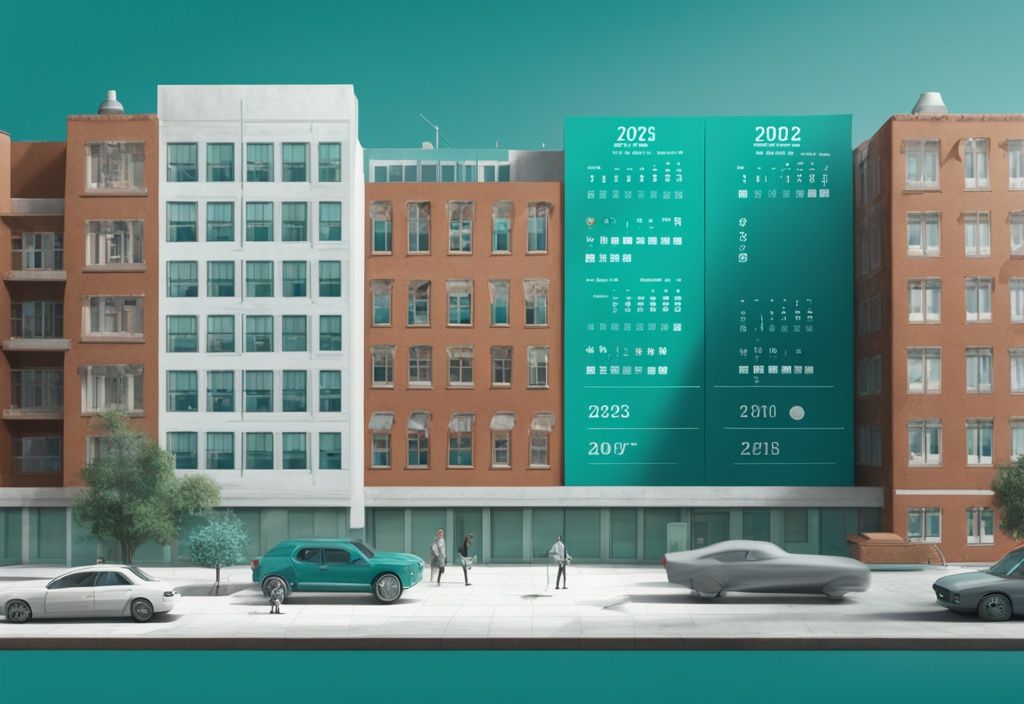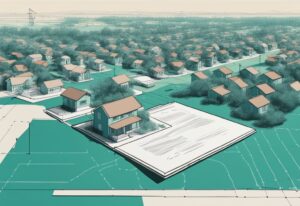
Revolution is brewing in the air! Are you ready to flip the script in the real estate market with the upcoming real estate laws in 2025? As a seasoned expert in the industry, I urge you not to underestimate the power of knowledge. These new laws are set to drastically change the housing game, and you do not want to be left behind.
Expect fascinating transformations in housing affordability, zoning regulations, and construction standards. Going from housing task forces to accessory dwelling units, imagine everything evolving! Isn’t it intriguing to stay one step ahead in this evolved real estate scenery?
This article, dear friends, will serve as your compass. Decoded here are the key law changes, their impact and what they mean for your real estate transactions. Brace yourselves for a whirlwind of information coming your way!
Introduction to Upcoming Real Estate Laws in 2025
The landscape of real estate is poised for significant legislative changes in 2025, heavily influenced by the upcoming 2024 elections. Housing affordability is at the forefront of political discourse, underpinned by the pressing issues surrounding high housing costs, which highlights the significant federal investments needed to address the shortage of 7.3 million affordable and available homes for the nation’s lowest-income renters, as discussed in a recent report by the National Low Income Housing Coalition here. One of the primary factors contributing to these elevated costs is the presence of restrictive local zoning regulations, which hinder the development of more affordable housing options.
State legislatures are taking noteworthy steps to ease these restrictions, gaining bipartisan support in the process. Loosening zoning regulations aims at addressing the housing affordability crisis impacting communities across the nation. Legislative efforts seek to create a more balanced and accessible housing market for all citizens.
Key recommendations for the upcoming legislative sessions include several crucial adjustments to current real estate laws. Firstly, reversing regulatory overreach is essential, as overbearing regulations often stifle development and increase costs. By streamlining procedures, legislative bodies aim to expedite the development process, reducing delays and associated expenses. Enhancing legal frameworks will provide clearer guidelines and support for new constructions while ensuring compliance with necessary standards.
Updating construction standards is imperative to align with modern needs and technological advancements. This step is expected to improve the quality and sustainability of new housing projects while also addressing affordability issues. Together, these legislative measures are set to shape the future of real estate in 2025, fostering a more accessible and equitable housing market.
Legislative Recommendations from Project 2025 by the Heritage Foundation
The Heritage Foundation has laid out a series of transformative recommendations in their Project 2025 report, addressing the upcoming real estate laws in 2025. These proposals aim to mitigate housing costs, enhance homeownership opportunities, and strike a balance between federal and local regulations.
Regulations Contributing to Housing Costs
As part of the upcoming real estate laws in 2025, the Heritage Foundation has identified that current regulations significantly drive up housing costs. Think about it—how often have you heard complaints about skyrocketing prices? They recommend localities take a proactive stance in revising land use, zoning, and building regulations. These revisions aim to facilitate and support new housing developments, which are essential to meet the increasing demand and stabilize housing prices. Imagine local governments acting like gardeners, pruning old rules to let new housing projects bloom.
Emphasis on Homeownership and Mid-Tier Rentals
Homeownership is highlighted as a critical avenue for building generational wealth. This isn’t just about owning a home; it’s about giving families a solid financial foundation. Unlike proposals that suggest reducing single-family zoning, Heritage stresses the importance of promoting mid-tier rental units as a balanced alternative. This ensures that not only high-end and low-end rentals dominate the market. Moreover, the Foundation suggests reforming public housing programs to foster self-sufficiency among residents. Imagine this: by strengthening work requirements and imposing limits on the duration of housing benefits, public assistance becomes a stepping stone rather than a crutch. This helps families move forward rather than just getting by.
Calls for Local Flexibility and Minimal Federal Interference
Upcoming real estate laws in 2025 also emphasize the delicate balance between reducing governmental regulation and preserving local control. The Heritage Foundation underscores the importance of minimizing federal interference in local zoning decisions while advocating for maximal flexibility for states and localities. Think of it as giving power back to your community, allowing them to create solutions that best reflect their unique needs and characteristics. This approach can foster more effective and localized policy responses.

Key Real Estate Law Reforms Predicted for 2025
Forming Housing Task Forces
In 2025, one of the key real estate law reforms will be the formation of housing task forces, taking inspiration from Montana’s Housing Task Force. These task forces will likely boast large and diverse memberships, ensuring various perspectives are considered. Tight deadlines will drive timely outcomes, while strong leadership will guide the teams toward actionable solutions. Transparency will be crucial for maintaining public trust and ensuring clear communication channels.
Permitting Accessory Dwelling Units (ADUs)
Accessory Dwelling Units (ADUs) will be a cornerstone in the upcoming real estate laws in 2025. Already, fourteen states have enacted laws permitting ADUs, paving the way for broader adoption. For instance, California has eliminated fees, owner-occupancy requirements, and parking minimums to promote ADU construction and alleviate housing shortages.
Implementation in Various States
California’s success with ADU legislation sets a benchmark other states are likely to follow. Addressing housing shortages becomes more feasible as states adopt similar laws. By removing barriers to ADU construction, housing availability will increase, offering more affordable options for residents.
Limiting Parking Mandates
Another major reform anticipated in 2025 is the limitation of parking mandates, which significantly add to housing costs. Colorado has pioneered this by abolishing parking minimums for multifamily buildings in well-served transit areas. By reducing these costly requirements, states aim to lower overall housing construction costs, making it more affordable for developers and, ultimately, for buyers and renters.
By focusing on these critical areas, the upcoming real estate laws in 2025 aim to create more flexible and cost-effective housing solutions. These changes address the growing need for affordable housing and foster more sustainable community development.
Legal Reforms to Support Future Construction
Changes in real estate laws are on the horizon, and the focus is solidly on accelerating construction projects and protecting property rights. Let’s dive into the key reforms coming in 2025.
Third-Party Reviews of Building Plans
Imagine you’re just about to start a major construction project, but everything grinds to a halt because of delays in getting your building plans approved. Frustrating, right? Well, upcoming real estate laws in 2025 are set to change this scenario significantly. Florida, New Jersey, Tennessee, and Texas are leading the way by introducing third-party reviews of building plans. This means that instead of waiting for an understaffed city department to get around to your plans, independent, certified reviewers can step in to expedite the process. This not only speeds up timelines but also reduces the administrative load on local governments, creating a smoother workflow for everyone involved.
Reforming Protest Petitions
If you’ve ever seen a promising development project hit a dead end because of a vocal minority, you’ll appreciate this next reform. In 2025, several states are targeting changes to protest petition statutes. Historically, small groups could use these petitions to block zoning changes, stalling beneficial developments for the broader community. By reforming or even repealing these statutes, the upcoming real estate laws aim to balance property rights more equitably. The idea is to prevent small, organized groups from stalling progress while still considering community interests, making rezoning efforts smoother and more fair for everyone.
Adopting Protections Against Downzoning
Now, let’s talk about safeguarding property values. One significant aspect of the upcoming real estate laws in 2025 is the focus on adopting protections against downzoning. Picture yourself as a property owner facing a new zoning regulation that decreases your property’s value—devastating, right? Arizona offers a prime example with its property value compensation law, which compensates landowners in such cases. These protections ensure that municipalities can’t implement zoning changes that financially harm property owners. By keeping property investment stable and reliable, these legal safeguards help build trust and stability in the real estate market. For a lighter take on the topic, check out the best real estate jokes that bring humor to the world of property investments.
2025 Legislative Predictions for Real Estate
Upcoming real estate laws in 2025 promise significant changes that will shape how we buy, sell, and manage properties. Here’s a breakdown of the key legislative areas you can expect to see transformed:
Climate Change Legislation
One of the most talked-about aspects of upcoming real estate laws in 2025 is climate change regulations. Expect laws that require sustainable construction practices. Builders will need to use materials and techniques that reduce carbon footprints and promote energy efficiency. Imagine a world where every new building is environmentally friendly—it’s not far off!
Smart Home Technology Requirements
Tech-savvy buyers, rejoice! Upcoming real estate laws in 2025 are set to mandate the integration of smart home technology in new constructions. From smart thermostats to advanced security systems, these requirements will ensure your new home is both functional and secure. Think of it as building homes of the future, today.

Energy Efficiency Ratings for Properties
Energy efficiency is becoming a critical consideration for homebuyers. Future real estate laws will likely introduce mandatory energy efficiency ratings for properties on the market. These ratings will provide a clear picture of a property’s energy performance and environmental impact, helping you make more informed purchasing decisions. Property owners will be incentivized to improve their ratings, boosting property values and promoting sustainability.
Regulations on Short-Term Rental Properties
With platforms like Airbnb becoming increasingly popular, upcoming real estate laws in 2025 will likely include new regulations for short-term rentals. Expect stricter guidelines, licensing requirements, and limits on rental days. These measures aim to balance the interests of property owners, renters, and local communities, ensuring that short-term rentals don’t negatively impact long-term housing availability and neighborhood stability.
Tenant Protection Laws
In high-rent markets, tenant protection laws are set to become stronger. New regulations will focus on preventing unfair eviction practices, capping rent increases, and ensuring that rental properties meet minimum habitability standards. The goal is to create a balanced and equitable housing market where everyone can find a safe and affordable place to live. Imagine a world where tenants feel secure and landlords maintain fair practices—sounds ideal, doesn’t it?
Impact of 2025 Real Estate Laws on Housing Affordability
With the upcoming real estate laws in 2025, there will be significant changes aimed at enhancing housing affordability. Let’s dive into how these laws might shape the landscape.
Zoning Regulations
Zoning regulations have always been a pivotal element in determining housing costs. With the new real estate laws in 2025, there’s a concerted effort to ease these restrictive regulations. Why is this important? Because less stringent zoning rules can drastically reduce housing costs by opening up more avenues for development. For instance, the promotion of transit-oriented developments (TODs) is a key strategy. To understand broader urban planning strategies, it’s helpful to know what MSA stands for in real estate. These developments not only cut transportation costs but also make life more convenient for residents. Imagine living in a place where you have easy access to public transit, grocery stores, and parks—all within walking distance.
Another exciting change is the push for mixed-use zoning reforms. This approach allows the integration of residential, commercial, and community spaces. Picture a neighborhood where you can live, work, and play without the need for long commutes. These vibrant communities can significantly increase the availability of affordable housing options.
Recommendations for Legislative Sessions
The legislative recommendations for the 2025 sessions focus on tackling high housing costs through several strategic measures.
Firstly, there will be a strong push to reverse regulatory overreach, which often leads to unnecessary cost increases. Ever felt frustrated by how long it takes for a housing project to get off the ground? Streamlining procedures can help ensure developments proceed without undue delays.
Improving the legal frameworks is another crucial step. These reforms aim to reduce complexities and make the bureaucratic landscape more navigable for developers. Simpler processes mean faster development and, ultimately, lower costs.
Updating construction standards to reflect modern practices and materials is equally important. By adopting new building technologies and materials, we can lower construction costs while enhancing the efficiency and sustainability of housing projects.
These comprehensive measures aim to address the root causes of high housing costs, creating a more affordable and accessible housing market for everyone. From easing zoning restrictions to streamlining regulations, these changes could make a significant difference in the everyday lives of residents.
Additional Key Legislative Changes Expected in 2025
In 2025, the real estate landscape is set to undergo significant legislative changes. Let’s delve into the specifics and understand how they might impact you.
Impact of Estate Tax Exemption Reduction
With the upcoming real estate laws in 2025, we can expect significant changes to the estate tax exemption. The new law reduces the exemption limit to around $6.8 million per person and $13 million per married couple. What does this mean for you? Simply put, more estates will now fall within the taxable bracket, increasing the tax liabilities for many.
Consider this: Real estate assets within these estates will be directly affected. This change will prompt estate planners and property owners to reassess their financial strategies. Re-evaluating financial strategies will be crucial to mitigate the increased tax burdens. Planning ahead can save a lot of hassle down the road, making it an essential focus for anyone with significant real estate holdings.

FinCEN’s New Anti-Money Laundering Regulations
Another critical aspect of the upcoming real estate laws in 2025 involves new regulations from the Financial Crimes Enforcement Network (FinCEN). Effective December 1, 2025, these regulations aim to combat money laundering with more stringent reporting requirements. So, what’s changing?
Non-financed transfers of residential real estate to legal entities and trusts will now need comprehensive reporting. This means providing detailed beneficial ownership information of the transferee entities or trusts. These measures are designed to enhance transparency in the real estate market.
Understanding what an option fee in real estate means can further clarify these regulations. Why does this matter? By preventing illicit financial activities, these regulations ensure a cleaner, more accountable transaction environment. This transparency is not only about compliance but also about fostering trust and security in the market.
Conclusion: 2025 Real Estate Laws Projections
The upcoming real estate laws in 2025 are poised to revolutionize the housing market with a clear focus on affordability. These legislative changes are centered around three main areas: addressing zoning, curbing regulatory overreach, and updating construction standards.
Firstly, zoning reforms play a crucial role. Localities will experience enhanced flexibility in their zoning laws, making it easier to overcome barriers to new housing developments. These changes aim to foster urban growth and address housing shortages by promoting transit-oriented and mixed-use zoning. By loosening restrictive zoning regulations, the new laws are expected to pave the way for increased housing supply and reduced costs.
Secondly, the upcoming real estate laws in 2025 prioritize the reversal of regulatory overreach. By streamlining procedures, the industry hopes to cut down on bureaucratic red tape that often delays construction projects. This streamlined approach not only accelerates timelines but also reduces associated costs, making housing projects more economically feasible.
Thirdly, improving construction standards is another key focus of the 2025 legislative reforms. Updated standards will ensure that new developments are sustainable, safe, and energy-efficient, aligning with broader climate change initiatives. These standards will also integrate modern technology requirements, such as smart home features, to enhance the living experience.
In summary, the upcoming real estate laws in 2025 aim to create a balanced approach that respects local autonomy while minimizing federal interference. This balance ensures that state and local authorities can adapt their strategies to meet unique regional needs without being hampered by overarching federal mandates. The goal is to foster an environment where housing is both affordable and accessible, aligning with the broader objective of creating sustainable and vibrant communities.
By addressing these pivotal areas, the upcoming real estate laws in 2025 aim to lay the groundwork for a more affordable and equitable housing market. The integration of smart zoning reforms, streamlined regulatory processes, and updated construction standards will collectively contribute to lowering housing costs and boosting supply, ultimately benefiting both developers and residents.
FAQ
What are the key changes in real estate laws expected in 2025?
- Increased local flexibility in zoning laws: Expect your locality to have more say in its zoning regulations, allowing for tailored solutions.
- Regulations to control housing costs: New policies aim to make housing more affordable, which could mean more options for those looking to buy or rent.
- Emphasis on homeownership and mid-tier rentals: The focus will be on promoting homeownership and expanding options for mid-tier rentals.
- Anti-money laundering regulations by FinCEN: FinCEN will implement stricter rules on non-financed real estate transfers to increase transparency and reduce illicit activities.
How will these laws impact housing affordability?
We could see a decrease in housing costs as zoning restrictions are loosened. Streamlined construction procedures and more efficient legal frameworks are expected to reduce development costs. Additionally, new policies promoting diverse housing options will likely make it easier for you to find a home within your budget.
What specific states are making significant changes to their real estate laws?
- California: Continues to lead with laws on Accessory Dwelling Units (ADUs) to increase housing availability.
- Colorado: Has abolished parking minimums in areas served by transit, aiming to optimize space use.
- Arizona, Rhode Island, Washington, Montana: Various zoning reforms and property protection measures are being implemented.
How will the new FinCEN regulations affect real estate transactions in 2025?
The upcoming FinCEN regulations will require more detailed reporting for non-financed residential real estate transfers. This added scrutiny is intended to enhance transparency and help thwart illicit financial activities. Be prepared for more paperwork, but also rest assured that these changes are for the greater good.
What are some anticipated future regulations for the real estate industry?
You can expect to see a range of new regulations, including mandatory smart home technology in new builds and energy efficiency ratings for properties. Stricter tenant protections, increased regulation on short-term rentals, and laws focused on urban development and climate change are also on the horizon. These changes aim to address the evolving challenges within the real estate market, making it more adaptive and sustainable.






